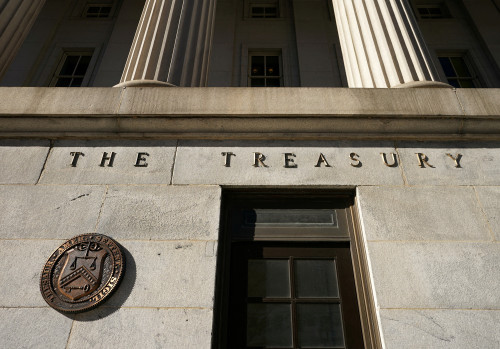By Davide Barbuscia
NEW YORK (Reuters) – Bond investors were thrown off balance on Monday by U.S. President Donald Trump’s weekend remarks on investigating Treasury debt payments for fraud, with some hoping they signaled a future pullback in debt issuance.
Speaking to reporters aboard Air Force One, Trump said officials reviewing wasteful spending had shifted their focus to the U.S. debt payments and suggested that the country’s $36 trillion debt load might not be that high.
Market participants on Monday were left speculating if the remarks indicated a possible reduction of the country’s overall debt burden going forward, resulting from an overhaul of the federal government through the Department of Government Efficiency (DOGE) led by billionaire Elon Musk, but said it was unlikely to mean disruptions to upcoming debt payments.
“It could be Treasury payments … which is not directly linked to Treasury bonds,” said Prashant Bhayani, chief investment officer for Asia at BNP Paribas Wealth Management. “I would be very surprised if they ever stopped a payment of Treasury bonds to a holder, it would be like shooting yourself in the foot,” he said.
DOGE has disrupted operations at several federal agencies and has raised privacy and security concerns as it has gained access to sensitive payroll and spending records. A federal judge on Saturday temporarily barred Musk’s team from accessing government payment systems, citing risks of data leaks.
Trump’s debt remarks follow comments by Treasury Secretary Scotty Bessent who said in a Bloomberg interview last week that the U.S. government borrowing trajectory is dropping. This, in turn, came after guidance from the Treasury Department last week that assuaged market concerns about imminent increases in long-term government debt issuance.
“If you put those comments together with Trump’s comments … I think this is going to be a very positive development for the Treasury market,” said Tony Farren, managing director at Mischler Financial Group.
He added, however, that any evidence of lower borrowing requirements would have to translate into lower sizes of Treasury debt auctions for the market to take into full account the agency’s progress.
“They’re going to have to come out and tell us concrete things that they found,” he said.
The Treasury Department, the White House, and three major credit ratings agencies did not immediately respond to requests for comment.
Benchmark 10-year Treasury yields were slightly higher on Monday ahead of some $125 billion in U.S. three-year, 10-year and 30-year Treasury auctions this week that will test demand for government debt. Spreads on U.S. sovereign credit default swaps (CDS) – market-based gauges of the risk of a default – were unchanged.
“We view (Trump’s) comments as referencing specific payments … rather than outstanding U.S. Treasury securities,” U.S. brokerage firm BTIG said in a note.
“We firmly believe that the White House is cognizant of the turmoil that would come from calling into question the validity of any U.S. Treasury securities, which bolsters our belief that the president was discussing specific budget items,” it said.
(Reporting by Davide Barbuscia and Tom Westbrook; Editing by Sandra Maler)


